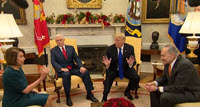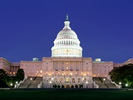Roundtable Comment Letter Recommends Additional Guidance from Treasury and IRS to Accelerate Capital Investment in Opportunity Zones
This week the Real Estate Roundtable provided
formal comments regarding opportunity zones to the Treasury Department and the IRS. The letter encourages Treasury to clarify a number of tax issues that would remove uncertainty for potential investors and opportunity fund managers. This is the second Roundtable comment letter on opportunity zones, following Treasury’s publication of proposed regulations in October. (
Roundtable Weekly, Oct. 19)
 |
|
This week the Real Estate Roundtable provided formal comments regarding opportunity zones to the Treasury Department and the IRS.
|
- The October proposed rules provided a strong foundation for opportunity fund formation and investment. Building on the rules, the Roundtable letter prioritizes five areas where additional guidance from Treasury would accelerate the pooling of capital and job creation in opportunity zones. The letter recommends that Treasury:
- Remove barriers to the formation of multi-asset opportunity funds through flexible exit rules;
- Clarify the circumstances in which land and previously vacant buildings constitute qualified opportunity zone business property;
- Allow appropriate refinancing of opportunity fund assets and avoid overly restrictive debt-distribution rules;
- Encourage continued investment in opportunity zones with flexible gain reinvestment, roll-over, and holding period rules at the investor, fund, and business level; and
- Provide additional protections in the working capital safe harbor and the substantial improvement rules for taxpayers making a good faith effort to comply with opportunity zone requirements.
- “Real estate development and redevelopment is a key component of any region’s economic strength and growth, wrote Roundtable President and CEO Jeffrey D. DeBoer. “The Roundtable foresees opportunity fund investors and fund managers actively partnering with local leaders and entrepreneurs on projects that both drive economic activity and respond to the needs of communities. Additional guidance along the lines described above will help ensure that the opportunity zone incentives fulfill their ambitious objectives.”
- The Treasury Department could issue a second set of proposed regulations on opportunity zones as soon as January, according to Treasury Assistant Secretary David Kautter (Roundtable Weekly, Dec. 14).
- The underlying legislation directs Treasury to report to Congress on opportunity zones’ effectiveness. The Roundtable letter encourages Treasury to consider, as part of its reporting, the aggregate impact of opportunity zone investments on the overall health and wellbeing of targeted communities, including the impact on the local tax base, surrounding infrastructure, and their ability to attract and retain employers.
The Roundtable comments are the product of an active Tax Policy Advisory Committee (TPAC) Opportunity Zone Working Group that includes leading real estate developers, owners, investors, lenders, industry organizations, and outside advisors. The TPAC working group will continue to work closely with government officials to help ensure the program fulfills its ambitious objective of stimulating economic development and job creation in low-income communities.


